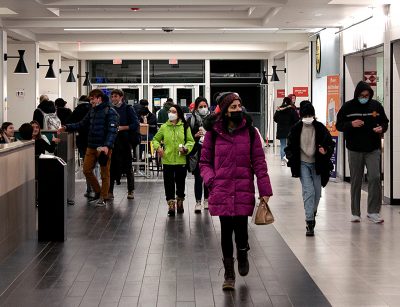
By Tanisha Bhat and Talia Lissauer
Boston University’s Healthway announced in an email Tuesday that it will no longer require masks in most public spaces starting March 7.
Students, faculty and staff will no longer have to wear masks in dining halls, residential housing common areas, shared offices, libraries, food courts, the FitRec, athletic venues and common areas in buildings and colleges.
However, masks will still be required in classrooms, the BU Shuttle and healthcare facilities.
Entertainment venues open to the general public, such as Agganis Arena, will no longer check for proof of vaccination in addition to dropping the mask mandate, as stated in the email.
“We ask that everyone be respectful of optional mask use in areas that no longer have a mask requirement in place and acknowledge that this will be a significant transition for many,” the email read.
The FitRec, which allows entrance for both BU and non-BU members, also stopped checking green badges Saturday.
As part of BU’s relinquishing measures, faculty and staff will no longer be required to test regularly, but can continue to do so at their discretion or if they come into close contact with someone who tested positive. Students will continue to be required to test weekly.
The change in policy came hours before the city of Boston announced it would be removing its mask mandate, and days after Boston mayor Michelle Wu lifted the city’s proof of vaccination policy. Additionally, it follows BU’s first seven-day positivity rate under 1%.
98.8% of BU is vaccine-compliant, while 73% of individuals in Massachusetts’ Suffolk County are fully vaccinated, according to state data.
Judy Platt, Student Health Services director and chief health officer, wrote in an email that while the University is alleviating its guidelines, it is not yet treating COVID-19 as endemic.
“The flu is endemic and we are still taking many more precautions against COVID than we typically do against the flu. However, our protocols will continue to evolve as we learn more,” Platt wrote.
BU spokesperson Colin Riley said the University’s goal is to get back to a pre-pandemic lifestyle, noting a Jan. 5 email by BU President Robert Brown which stated the University would reassess its COVID-19 policies as the semester went on.
“There were some changes made then and our goal is to get to pretty good pre-pandemic lives as we are able,” Riley said. “These are steps in that direction.”
Riley added that the University is fortunate the pandemic “ran its course.”
“Our faculty and staff have been extremely responsible as [well as] students, who’ve been terrific,” Riley said. “We wouldn’t be at this point in 2022 if that wasn’t the case.”
Michael Halasnik, a senior in the College of Arts and Sciences, said he was surprised to hear mask policies being relaxed before testing policies, but added he is relieved that the world is returning to how it once was.
“It makes me feel like things are starting to come back to normal,” Halasnik said. “I feel like we can start living life without coronavirus a little bit again.”
Valeria Hernandez, a freshman in the College of Communication, said she feels “bittersweet” about the change, especially considering many of her friends have tested positive in the last week.
“Sweet in the sense of going back to normal life and it’s nice not having to wear masks in certain places,” Hernandez said. “But also it’s bitter because you never know if there’s gonna be an outbreak or if this is gonna make things worse, especially with the unobserved testing.”
The announcement comes one week after BU’s previous policy change went into effect — which made it so undergraduates could return to once-a-week COVID-19 testing, reinstated the University’s original visitor policy and announced green badges would no longer be required to enter dining or residence halls.
It also comes nearly a month after the University began its transition to unobserved testing.
Hernandez said she is concerned with the reliability of unobserved testing.
“I’m glad to have freedom but I would prefer we have observed testing so that way we can make sure that everyone’s doing it fairly and make sure everyone’s safe,” Hernandez said.
Halasnik said he hopes BU “continues to be open and communicative” about further changes to its COVID-19 policies.
“As long as we have honesty and transparency within our administration to the student body, I think everything should work out,” Halasnik said.





























































































































